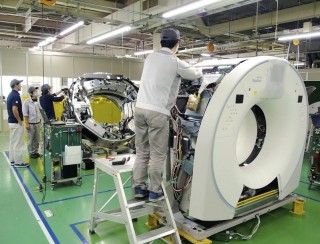Loading
Search
▼ Canon Bid Ensured Toshiba’s Capital
- Category:Other
By Yukinobu Sakamoto and Yu Komagata / Yomiuri Shimbun Staff Writers
In the end, being able to get some cash quickly sealed the deal for Toshiba Corp.
Toshiba’s decision to grant Canon Inc. exclusive negotiating rights for its medical equipment subsidiary has made it likely that Toshiba can avert a financial crisis for the time being. Toshiba plumped for Canon after an intense bidding war mostly because it wanted to acquire capital before closing its accounts at the end of March.
With Toshiba scrambling to improve its financial standing, Toshiba Medical Systems Corp. (see below) was an excellent subsidiary and was regarded as a valuable asset. “We need to get cash quickly,” a Toshiba executive admitted in January. “Having a business we can sell for a high price certainly helps.”
A downturn in business performance triggered by an accounting irregularities scandal and the allocation of restructuring costs accompanying the layoff of more than 10,000 employees led to predictions that Toshiba’s capital adequacy ratio, an indicator of a company’s financial health, would sink to about the 2 percent level, which is close to having liabilities exceeding assets. Although this would not directly lead to bankruptcy, having excessive liabilities generally results in a loss of confidence from the markets and can make it more difficult to borrow money from banks. The Tokyo Stock Exchange’s designation of Toshiba stock as a “security on alert” also became a barrier to raising funds.
The previous Toshiba management had positioned Toshiba Medical as a pillar of the company’s growth. Toshiba’s decision to sell off this prized asset symbolizes the strong sense of crisis that has enveloped the company.
Tempting target
Some time around December 2015, Toshiba reportedly informally sounded out Fujifilm Holdings Corp. about purchasing Toshiba Medical. Fujifilm is concentrating on the medical field and welcomed the approach.
“A deal with us would offer the most synergy,” a Fujifilm executive said.
However, the race to snare Toshiba Medical quickly developed into a fierce scrap. Many market insiders felt such a tempting target “would not go up for sale again,” given that Toshiba Medical is ranked fourth in the world in imaging devices such as computed tomography scanners, a track record that shows it can compete with overseas rivals. Financially powerful Canon entered the fray and the sale price soared from the initial forecasts of ¥400 billion to ¥500 billion, then to ¥600 billion and to ¥700 billion.
The surging price forced many potential suitors to drop out of contention.
When the second round of bidding closed on March 4, only Canon, Fujifilm and a team comprised of Konica Minolta Inc. and an investment fund remained in the race.
Toshiba reportedly laid out conditions for the second round of bidding that at one point included having the purchaser pay part of the bidding price in advance. These developments, plus the rising cost of Toshiba’s medical subsidiary, pushed the Konica Minolta camp to withdraw from the contest, effectively setting up a showdown between Canon and Fujifilm.
How they stacked up
Even after this happened, some observers thought Fujifilm held an advantage, but in the end Toshiba selected Canon. Several decisive factors helped Canon clinch the deal.
It is believed Canon offered a price worth several tens of billions of yen more than Fujifilm put forward. Moneywise, it tabled the more appealing offer.
Toshiba also decided the Canon option would make dealing with antitrust authorities easier because there was little overlap in their businesses, which would minimize concerns the sale could infringe on the
Antimonopoly Law. Toshiba Medical has sales of ¥400 billion, whereas Canon’s medical business reportedly has sales in the range of several tens of billions of yen. Furthermore, Canon’s operating base is primarily in Japan, making it highly likely antitrust regulators overseas would find no problem with the sale.
Toshiba was concerned that because Fujifilm’s medical business operations were of a similar scale to Toshiba Medical’s, significantly higher screening hurdles would need to be cleared for the sale to go through. Another key factor was the lack of overlap will make it easier to retain the employees of Toshiba Medical. In the end, Toshiba decided Canon’s proposal would lead to a quick recovery of its capital adequacy ratio.
■ Toshiba Medical Systems Corp.
A Toshiba Group company that makes and sells medical equipment. Holds the largest share (about 30 percent) of the domestic market for imaging devices, and ranks fourth in the world behind companies including General Electric of the United States. Head office is in Otawara, Tochigi Prefecture. According to Tokyo Shoko Research, Ltd., Tokyo Medical had the highest sales of any company based in the prefecture in fiscal 2014, so many people in the area have urged it not to shift operations elsewhere.
- March 11, 2016
- Comment (0)
- Trackback(0)


